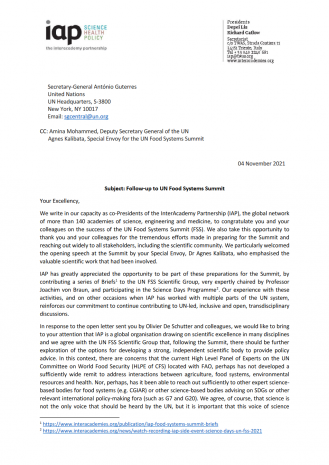This letter is a follow-up to the UN Food Systems Summit.
Your Excellency,
We write in our capacity as co-Presidents of the InterAcademy Partnership (IAP), the global network of more than 140 academies of science, engineering and medicine, to congratulate you and your colleagues on the success of the UN Food Systems Summit (FSS). We also take this opportunity to thank you and your colleagues for the tremendous efforts made in preparing for the Summit and reaching out widely to all stakeholders, including the scientific community. We particularly welcomed the opening speech at the Summit by your Special Envoy, Dr Agnes Kalibata, who emphasised the valuable scientific work that had been involved.
IAP has greatly appreciated the opportunity to be part of these preparations for the Summit, by contributing a series of Briefs to the UN FSS Scientific Group, very expertly chaired by Professor Joachim von Braun, and participating in the Science Days Programme. Our experience with these activities, and on other occasions when IAP has worked with multiple parts of the UN system, reinforces our commitment to continue contributing to UN-led, inclusive and open, transdisciplinary discussions.
In response to the open letter sent you by Olivier De Schutter and colleagues, we would like to bring to your attention that IAP is a global organisation drawing on scientific excellence in many disciplines and we agree with the UN FSS Scientific Group that, following the Summit, there should be further exploration of the options for developing a strong, independent scientific body to provide policy advice. In this context, there are concerns that the current High Level Panel of Experts on the UN Committee on World Food Security (HLPE of CFS) located with FAO, perhaps has not developed a sufficiently wide remit to address interactions between agriculture, food systems, environmental resources and health. Nor, perhaps, has it been able to reach out sufficiently to other expert science-based bodies for food systems (e.g. CGIAR) or other science-based bodies advising on SDGs or other relevant international policy-making fora (such as G7 and G20). We agree, of course, that science is not the only voice that should be heard by the UN, but it is important that this voice of science transparently represents excellence and inclusivity in taking a systems-based approach to tackling agreed societal priorities.
IAP welcomes your commitment in the Statement of Action following the Summit for a UN coordination hub to draw upon the wider UN system capabilities, with one of its key roles to support strengthening of science-policy capabilities. In this context, IAP recommends that further consideration be given to the options for strengthening the science-policy interface, in particular the potential for an ‘Intergovernmental Panel for Food’. Reforming the present global advisory mechanisms would also create the opportunity to build the necessary connections with science-policy interfaces at national and regional levels, which seems central for implementation of the actions you appropriately highlighted at UN FSS.
A couple of weeks ago, IAP published a Statement, endorsed by more than half of its member academies, calling for closer integration between policies and scientific advisory activities relevant to the UN Convention on Biological Diversity (with IPBES) and the UN Framework Convention on Climate Change (with IPCC). A greater coordination of these activities is now deemed essential to provide the critical mass of effort to tackle inter-related problems. However, this potential strategic convergence of UN-led activities on biodiversity and climate change will further highlight the current weakness that there is no intergovernmental body or global advisory group with equivalent structure and function for food systems. Yet the opportunities and challenges for food systems are intimately connected with climate change and biodiversity and must be part of any broader policy convergence. Thus, the Summit should be a turning point for food systems and we urge you to use the momentum created for transformative solutions.
At this time of climate change and COVID-19, when we are already falling behind in attainment of some SDGs, the world faces unprecedented threats. But there are also unprecedented scientific opportunities and it is vital, collectively, to ensure that we build the best mechanisms to capitalise on scientific excellence to find and implement solutions in urgent pursuit of the objectives for health, equity and sustainability. IAP stands ready to help you and your colleagues in developing these necessary capacities.
We note that there are various possible ways to strengthen and reform the current food systems related advisory mechanism but these are for future collective delineation. The purpose of our letter is to support placing the issue on the agenda for inclusive debate, while emphasising the importance of capitalising on scientific excellence – rather than prescribing a specific solution. We at IAP are available to engage in such a process.
With kindest regards,
Richard Catlow and Depei Liu, IAP co-Presidents

